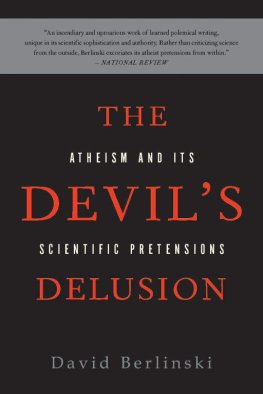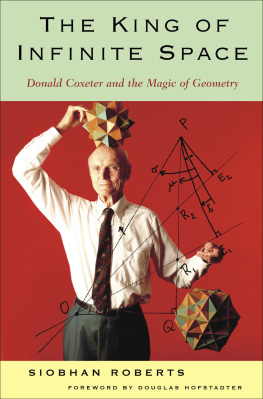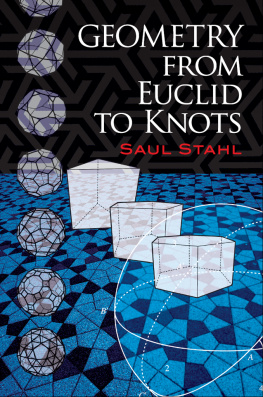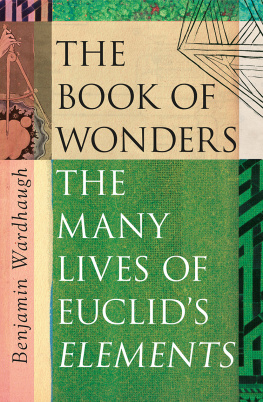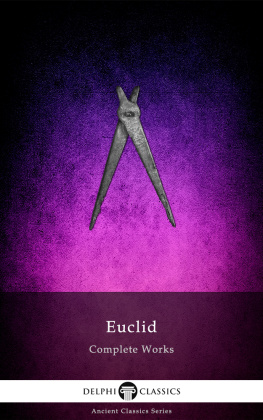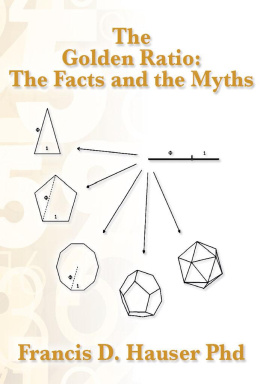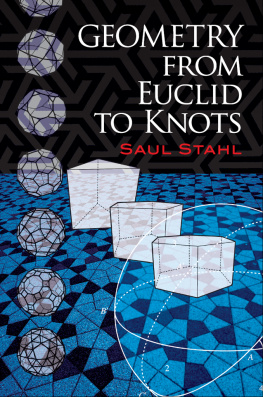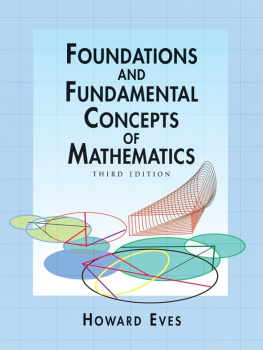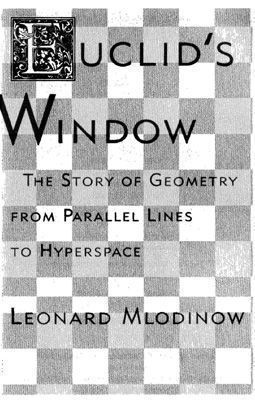THE KING OF INFINITE SPACE
ALSO BY DAVID BERLINSKI
One, Two, Three
The Deniable Darwin & Other Essays
The Devils Delusion
Infinite Ascent
The Secrets of the Vaulted Sky
The Advent of the Algorithm
Newtons Gift
A Tour of the Calculus
Black Mischief: Language, Life, Logic, Luck
The Body Shop
Less Than Meets the Eye
A Clean Sweep
On Systems Analysis
THE
KING OF INFINITE
SPACE

EUCLID
AND HIS
ELEMENTS

DAVID BERLINSKI
BASIC BOOKS
A Member of the Perseus Books Group New York
Copyright 2013 by David Berlinski
Published by Basic Books,
A Member of the Perseus Books Group
All rights reserved. No part of this book may be reproduced in any manner whatsoever without written permission except in the case of brief quotations embodied in critical articles and reviews. For information, address Basic Books, 250 West 57th Street, 15th Floor, New York, NY 10107.
Books published by Basic Books are available at special discounts for bulk purchases in the United States by corporations, institutions, and other organizations. For more information, please contact the Special Markets Department at the Perseus Books Group, 2300 Chestnut Street, Suite 200, Philadelphia, PA 19103, or call (800) 810-4145, ext. 5000, or e-mail .
Designed by Trish Wilkinson
Set in 11.5 point Minion Pro
Library of Congress Cataloging-in-Publication Data
Berlinski, David, 1942
The king of infinite space : Euclid and his Elements / David Berlinski.
pages cm
Includes index.
ISBN 978-0-465-03346-1 1.Mathematics, Greek.
2.GeometryHistory. 3.Euclid. 4.Euclid. Elements. I.Title.
II.Title: Euclid and his Elements.
QA31.B47 2013
516.2dc23
2012042492
10987654321
For Morris Salkoff
On peut avoir trois principaux objets dans ltude de la vrit: lun, de la dcouvrir quand on la cherche; lautre, de la dmontrer quand on la possde; le dernier, de la discerner davec le faux quand on lexamine.
BLAISE PASCAL, DE LESPRIT GOMTRIQUE
Contents
E UCLID IS UNIVERSALLY acclaimed great. His name is in no danger of being lost. He belongs in the company of men whose reputation defies revision. This is to establish Euclids place, but hardly to say why so many years after his death, he continues to enjoy it.
Euclid is, of course, the author of the Elements, and the Elements is by far and away the most successful of mathematical textbooks. A textbook that has survived for more than two thousand years represents an uncommon achievement. Most textbooks have a short and ignominious life. They serve a purpose, but they do not inspire reverence.
Euclids Elements is different.
No one has ever found a better way of presenting the elements of plane geometry; no sensitive teacher would think to use a substitute. There is none.
The Elements is not simply a great book in mathematics: it is a great book. The contemporary reader, eager for Euclids personal revelations, will quit the Elements unsatisfied. There is not a word about them. But in writing the Elements, Euclid found a way to impose his own powerful personality on the scattered propositions of geometry, and by imposing on them, created an immense structure, a logical space, a world in which there is growth, and form, and intimate dependencies among parts, something very large but not sprawling, the Elements itself the overflow in print, paper, or papyrus of a mind singular and determined.
Having revealed nothing of interest, Euclid, of course, has revealed everything of importance.
If this is not an artistic achievement, then nothing is.
Paris, 2012
THE KING OF INFINITE SPACE
Lhomme cest rien; loeuvre cest tout
(The man is nothing; the work, everything).
GUSTAVE FLAUBERT
T HE ROMAN ARCHITECT Marcus Vitruvius Pollio lived and worked in the first century BC. His treatise Libri Decem, or The Ten Books, was dedicated to Caesar Augustus some twenty years before the birth of Christ. Vitruvius was both an architect and a military engineer, and The Ten Books contain a remarkable account of classical architectural ideas and building methods. It is sophisticated. A building, he insists, must be durable, useful, and beautiful (firmitas, utilitas, venustas). These are simple but stringent standards. Very few buildings constructed in the past sixty years could meet them. Vitruvius writes as a critic as well as a commentator, a man prepared to judge men as well as buildings, and when he does, he takes pride in seeing things as they are.
In his sixth book, De Architectura, Vitruvius recounts a story, one told as well by Cicero, about Aristippus, a fourth-century philosopher. Finding himself shipwrecked and cast on the Rhodian shore, he despaired.
Aristippus then happened to notice some geometrical figures scratched into the sandtriangles, perhaps, or circles, or straight lines suspended between points, the careless detritus of someone squatting by the seashore and thinking about shapes in space.
He said to his companions, We can hope for the best, for I see signs of men.
Aristippus was well known for his devotion to pleasure; he was notorious. When rebuked for sleeping with whores, he responded equably that a mansion does not become useless because it has already been used. We expect such men to be tested; we are disappointed if they are not. It is right that Aristippus found redemption in human solidaritythe signs of men.
M ATHEMATICS IS WHAT mathematicians make of it. What other standard would apply? Still, mathematicians exhibit a very nice sense of what they should make of what they have made. They are, after all, border guards at their own frontiers. Is mathematical logic a part of mathematics? Or mathematical physics? Most mathematicians would say they are not. They never doubt the importance of these subjects. They are not blind. But mathematicians are as fussy as cats. And almost as conservative. Their deepest commitment is to shapes and numbers, the seeing eye, the beating heart.
Counting would seem to come first, no? Every living creature makes the distinction between the thing that it is and the thing that it is not. Two numbers are required to express all of the imperatives of biology.
This is me, that is not.
Long live the numbers then.
But then there is seeing. Shapes are metaphysically as compelling as numbers. A single point, after all, divides the universe into what is at the point and what is not.
Long live the shapes too.
Shapes and numbers are in some sense coordinated. Points often have a numerical address. The latitude and longitude of Adelaide is 34 by 55S and 138 by 36E. The letters S and E may themselves be replaced by the numbers 19 and 5, their position in the alphabet. The result is a number marking Adelaide 345519138365. In just the same way, numbers often have a location. The number 345519138365 is notable in indicating the point where one finds Adelaide.
Long live the shapes and the numbers.
S OME CULTURES ARE geometric in their sensibility, and others are not.
Prizing order, the Romans of the empire appreciated severity. They did not fool around.
A powerful visual orthodoxy dominated their landscape: amphitheaters, public monuments and squares, cities divided into blocks, senatorial villas arranged in a rectangle around an interior space, a great urban civilization spreading throughout southern Europe and the Mediterranean basin.


